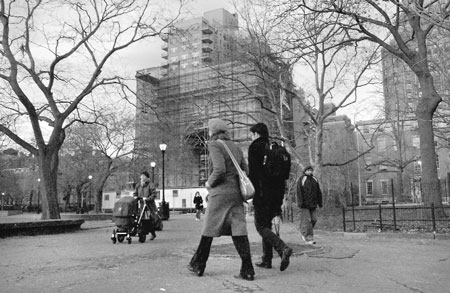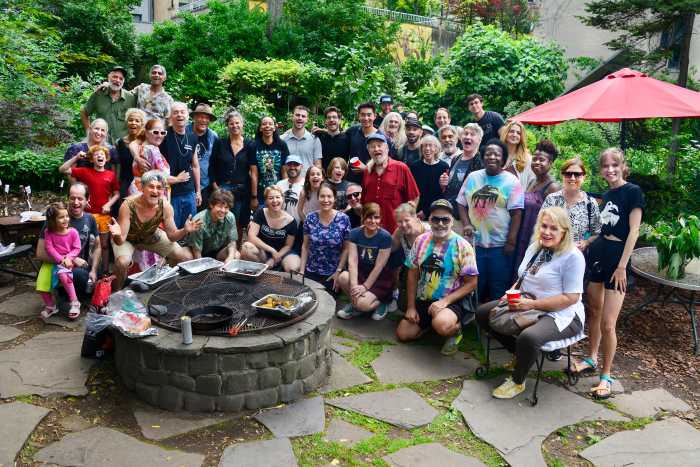By Lincoln Anderson
Two years ago, community interest was generated around renovating Washington Sq. Park. There was a well-attended Community Board 2-sponsored meeting at which designer George Vellonakis presented a preliminary redesign for the landmark park, and there was talk of creating a fundraising group to pay for the work and the park’s maintenance. At the meeting, Parks Commissioner Adrian Benepe explained how parks conservancies and friends of parks groups operate.
Two years later, not much progress has occurred: No final renovation plan has been decided upon and only a portion of the needed funds has been secured.
Aubrey Lees, who as Board 2’s chairperson, made renovating Washington Sq. Park a priority, is now the board’s Parks Committee chairperson. At another well-attended Parks Committee meeting last Wednesday night, Lees, in a sense, picked up where things left off two years ago.
Vellonakis again presented the same plan he showed the last time, the main features of which include raising the park’s sunken central plaza and removing the low concrete walls in the park’s corners.
Lees said she feels it’s important for Board 2 to approve a plan, even if just a preliminary one, so that the process can start moving forward — and she feels the Vellonakis plan is a good start.
Although Washington Sq. Park isn’t exactly falling apart, it certainly doesn’t look as magnificent as many feel it could or should, especially given its central importance to the Village and its international reputation. The park’s last major renovation was in 1970 after a four-year community-led design process.
In a nutshell, Lees defined the current objectives as, “Get rid of the drug dealers and the rodents.”
Although drug dealing has decreased dramatically in the park since the installation of police cameras five years ago, dealers still congregate on the west side of the park’s plaza near the Holley statue.
Explaining the plan, Vellonakis stressed it was just “to give a sense of what we’re thinking about” and by no means final. He said the project would be done in two phases, so the entire park would never have to be closed at once. The Parks Department hopes to raise funds for half the renovation first, then the other half.
Construction would start at the end of 2004 or in early ’05. The project’s cost estimate is $6 million to $10 million; if a new park office building and restrooms are built the cost would increase, he said.
However, so far, the only money allocated for the project is $600,000 from Councilmember Alan Gerson.
Vellonakis’s plan would preserve the park’s fountain as “a space of celebration,” where people would continue to be able to sit and enjoy the water and where musicians and buskers could perform. The chess table area in the park’s southwest corner would remain, but with nicer tables and paving.
The designer said a possibility would be to move the park’s existing dog run to the Teen Plaza area just east of LaGuardia Pl., next to N.Y.U.’s Bobst Library, to create an inviting lawn area in place of the run.
Pointing to the need for more seating, Vellonakis noted many paths in the park are without benches for long stretches.
A more stately, historic-looking fence, similar to that ringing Bryant Park, would replace the low pipe railing around the park, Vellonakis said.
Another idea is to relocate the Washington Sq. Music Festival from by Teen Plaza to better spots in the park by using a mobile stage, he added.
The issue of the play mounds’ redesign was postponed until next month’s Parks Committee meeting, because the redesign wasn’t ready.
On funding, Bill Castro, Manhattan borough Parks commissioner, explained that for park renovation projects, the department depends on contributions from elected officials. Parks uses its capital projects funds for essential maintenance, like fixing paths, he said.
In response to a question from Jo Hamilton, a C.B. 2 member, as to whether Parks is serious about renovating Washington Sq., Castro replied, “It’s one of our top priorities for the borough. I’m sure we can [get the funding].”
Stressing the need for the project, Lees reiterated, “It’s really disgusting, drug infested. I’m sure you’ll agree with me….”
“No, I don’t agree with you,” Castro answered, saying he thought the police were doing a good job protecting the park. But then he conceded, “You’re right — there are drug issues.”
Castro added that if they have an approved design plan to “shop around” to potential donors, it would help fundraising.
Mounds eruption
It was seemingly only a matter of time, however, before the volatile mounds issue erupted. Parents have always feared Parks wants to eliminate the three small children’s climbing hills, currently in a dilapidated state. In a loud voice, Donald Rogers of MacDougal St. objected to the “last-minute deletion of the mounds” from the meeting agenda.
“This is a parliamentary technique that we’ve all seen before,” he said, adding, “If you want to raise money for the park this is not a good start.”
Diane Whelton, a former resident of the square, asked for a commitment from Parks to construct a playground by the mounds where one existed years ago.
“I’m not committing to that,” answered Castro, adding he wants to hear what the whole community wants before approving a new playground — “or, we’re not doing right the public at large,” he stressed.
Others in the audience referred to this as a “’tween playground,” meaning it would be for 9-to-15-year-olds, those too big for the park’s two toddler playgrounds.
Castro had to leave, but assured he would return next month to discuss fundraising for the park’s renovation.
Livvie Mann of Bedford St. asked if there was anything in Vellonakis’s design to passively reduce drug activity in the park.
Vellonakis said eliminating the low concrete walls in the park’s corner seating areas would help by opening up sightlines.
“Visibility is key,” he noted.
The question was raised whether any fundraising mechanism for the park existed.
“There is, but only for the mounds,” a mounds mom called out.
The mounds parents have successfully fundraised several thousand dollars for the restoration of the contentious humps, located near the park’s southwest corner.
Honi Klein, executive director of the Village Alliance business improvement district, announced that the Alliance’s June 12 Taste of Washington Sq. raised $53,000 for the park, which she called the first-ever public fundraiser for the park. The Village Alliance, which underwrote the cost of the event and “didn’t take a penny,” Klein noted, will keep the money in a separate fund until construction starts on the park’s renovation.
“I think now is the time to get this park refurbished,” Klein told the audience. “Everybody’s going to get something [in the final design]…. The point is that park is a disgrace. It’s the most historic park in the Northeast. The lighting is terrible; the paths are terrible. We have to push them.”
Added Lees: “No one cares about Washington Sq. Park except us. We have to kick and scream.”
Fundraising issues
As for fundraising, The Washington Sq. Association was initially identified as the vehicle to do so. Elizabeth Butson, publisher emeritus of The Villager, who with Anne-Marie Sumner, president of the Washington Sq. Association, has been spearheading the effort, said they are ready to start, but that having a final plan is crucial.
“The association is ready to help in the fundraising effort when plans are finalized,” Butson told The Villager in an e-mail message. “We do have a tax-exempt account for this project (The Fund for Washington Sq. Park) for those who want to start contributing. The account was opened by the Washington Sq. Association at the Independence Savings Bank [43 E. Eighth St.] in the Village.”
Despite only having raised a small amount of funds so far, Sumner said the Washington Sq. Association isn’t ready to relinquish the responsibility and is just waiting for a more concrete proposal from Parks.
“The association has the legal constraints in place to do the fundraising,” she said. “It’s up to the Parks Department to say what they want done. How can you go to a donor? You can’t do fundraising without specifics as to what needs to be done and specifics. It’s too vague…. Everyone has to be a little more patient; and we’ll be very active as soon as the opportunity presents itself. And that has much do with what the Parks Department says.”
Privately, some said more was expected of N.Y.U. on the fundraising front, mainly in the form of a big donation at the start, rather than at the end of the process; the reasoning is that contributors would be encouraged to donate if they saw that others, such as N.Y.U., had already given money.
Meanwhile, the Parks Department is reportedly hoping to target some big donors, which could take some of the burden off the Washington Sq. Association to do it all.
Lees also stressed the importance of N.Y.U.’s participation, noting that, unlike Union Sq. or Madison Sq. — two parks that have benefited from the contributions of business associations — Washington Sq. doesn’t have big institutions surrounding it other than the university.
“As far as I’m concerned, they’re doing nothing,” Less said of N.Y.U. “I don’t care if they give a quarter million dollars to the park to make it look nice for their graduation.”
Michael Haberman, N.Y.U. director of government and community relations, blasted Lees for saying the university doesn’t do enough for the park.
“It’s absurd to say that,” he said. “We pay for gardeners, security officers, the maintenance of the park. These are year-round things that go beyond graduation. We’ve pledged $15,000 annually to maintain the arch.”
As for the fundraising dilemma, Haberman said: “From the start we said we want to be part of any group that’s raising money. But it doesn’t exist right now. It’s premature [to be talking about making a financial contribution]. The Washington Sq. Association decided it was going to lead, but then decided it’s not something they want to take on. There is nothing right now — other than a bank account.
“Washington Sq. Park is important to us and the city and it’s known throughout the world. We’re certainly in agreement that it’s in need of renovations and we’re eager to be a part of that.”
In a phone interview, Lees said she feels the Washington Sq. Association hasn’t done enough towards fundraising and that a full-fledged conservancy is needed.
“Is the Washington Sq. Association equipped to accept money?” she asked. “There’s nothing online on how to give money or where to mail a check. A conservancy can be established. We need some group — such as every major park has — to manage this. I just think people have given up on the park.”






































